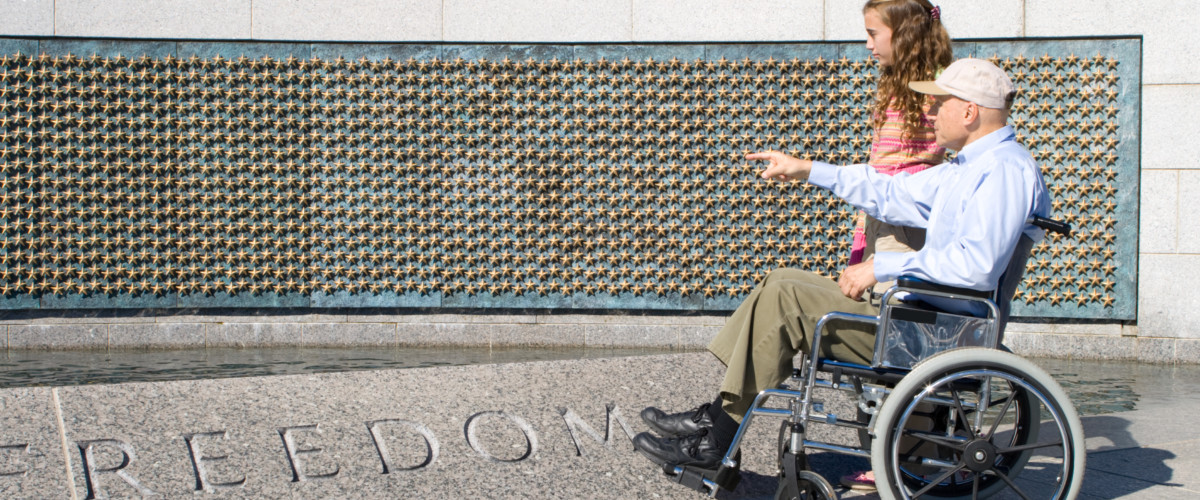War Stories

In Erich Maria Remarque’s 1931 novel, “The Road Back” (sequel to “All Quiet on the Western Front”), he follows a group of German soldiers home, as they try to reintegrate into civilian life after Germany’s surrender. They find everything changed—themselves, their friends, their family. When pushed to tell the family about his experiences, Ernst, the narrator, thinks to himself, “A man cannot talk about the things out there with civilians, and I know nothing else.” He quickly excuses himself to meet up with his buddies.
All veterans have stories. Sometimes their family is the last to hear them. That was true for John Bradley, a Navy corpsman on Iwo Jima. It was only after he died that his son, James, began to piece together stories that became his book, “Flags of Our Fathers.”
A hundred years ago my grandfather, Frederick William Smith, was one of many American “doughboys” heading to France. He served in the trenches in the 10th Field Artillery, was gassed, but he stayed in the Army for four years after the war, serving in the Third Cavalry at Fort Myer, Virginia. I have pictures of him on his horse and with the band (he played trumpet and French horn). And I have several of his medals.
My grandfather died months before I was born. He was sixty-five. Today we’d probably diagnose him with PTSD. We’d say he “self-medicated” with alcohol. He kept his stories to himself. He was proud of his service, though. He painted the “Indianhead” patch of the Second Infantry Division on the sign in front of his house advertising chair caning and antique refinishing. He was active in the VFW. He trotted out his medals to show to neighborhood boys. But he kept the stories to himself.
My great uncle Jack died two years ago. He wasn’t reticent about sharing his stories. I heard many over the years. He was a Seabee in the South Pacific, serving on Saipan, Tinian, and Okinawa. He was chief engineer on the hydraulic lifts that raised the atomic bombs into the bellies of the Enola Gay and Bockscar.
I was recently at Lackland Air Force Base in San Antonio, where my dad did basic training. I’m planning a trip to San Angelo, where I want to visit Goodfellow Air Force Base, where he did tech school. He was a “Chiling,” a Chinese Linguist, and did his Chinese training at Yale’s Institute of Far Eastern Languages. I’ve recently connected with a couple of veterans who were at Yale and Goodfellow with him. They told me some stories—stories my dad is no longer able to tell due to dementia.
Who are the veterans in your family? Have you listened to their stories? If a veteran, have you told yours? Write them down, while you can. If you have Korea or WW2 veterans in your family, interview them. Preserve and transcribe the recording. Compile a scrapbook. Collect their memorabilia and make a shadow box display. Learn about the places they went, the things they did.
Did no one in your family serve? Then connect with your local VFW post. Make friends of veterans. Listen to their stories. Welcome them home.
The 2012 film, “Memorial Day,” weaves together the stories of a WW2 vet, Bud Vogel (played by James Cromwell), and his grandson, Kyle Vogel (Jonathan Bennett), an Iraq veteran. The young Kyle opens his grandfather’s trunk, and asks about the items in it. Years later, it is Kyle who is telling stories to his grandfather, completing the circle and deepening the relationship.
Sharing stories between generations benefits both the storyteller and the hearer. It helps the storyteller who is a veteran reconnect with civilian life, and can have a cathartic effect. Emotions, memories, sacrifices, values –these are intangibles, unlike medals or memorabilia, but the telling of stories preserves them, and makes them part of a shared heritage, a common story. And it is in the midst of these shared stories we find wisdom, a key attribute of positive aging.
Bill Cork
